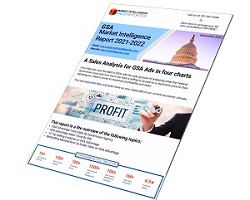Becoming a General Services Administration (GSA) Schedule holder can offer incredible opportunities for your business, such as long-term government customers, access to exclusive marketplaces, unique marketing solutions and more. The U.S. Government only wants to work with the best qualified businesses, so winning a GSA Schedule contract is no easy task; you must write a competitive GSA Schedule Proposal and stand out from the crowd.
- What is the Pricing Section of the GSA Schedule Proposal?
- What Are the Requirements for the Pricing Section?
- How Can I Expedite My GSA Schedule Proposal?
- Creating A Competitive GSA Schedule Proposal
The GSA proposal involves three sections:
- Administrative section: who you are and what you do
- Technical section: your established technical capabilities
- Pricing section: your pricelist and justification
In this guide, we’re going to address the final section of your GSA proposal: pricing. We’ll explain how to prepare this part of the application, so that your proposal can be processed without delay, enabling you to get on the GSA Schedule as soon as possible!
What is the Pricing Section of the GSA Schedule Proposal?
The Pricing Section is the final and most complex section of the GSA Proposal. Here, you must set out your prices and price justification. Based on this, the GSA Contracting Officer (CO) assigned to your application will decide if your prices are “fair and reasonable” according to the Federal Acquisition Regulation (FAR) Part 15. But what does this mean?
One benefit that the GSA Schedule offers to the U.S. Government is procurement of goods and services at the most competitive prices, which are either the same or lower than what a GSA contractor offers their ‘Most Favored Customer’ (MFC). The GSA CO will review the prices of “like and similar” products or services in the commercial and federal marketplaces, particularly your competitors who have previously received a GSA contract. If the CO does not find that your pricing is fair and reasonable, they can reject your proposal.
A lot of market research is involved to ensure that your prices are satisfactory to GSA, whilst not jeopardizing your future profits. On top of this research, you must prepare and submit the required documents which we’ve outlined below.
What Are the Requirements for the Pricing Section?
Getting on the GSA Schedule involves some heavyweight bureaucracy, and the Pricing Section is no different. Submitting a carefully-prepared proposal not only supports your application, but demonstrates your responsibility, competence, and commitment towards government contracting.
The core documents required for a GSA price proposal include:
- Price Proposal Template (PPT)
Your Pricing Section is centered around your GSA Proposed Pricelist (PPT). Visit GSA’s website and download the Price Proposal Template MS Excel spreadsheet. There are two PPT options: for the Commercial Sales Practice or Traditional Route; or for the Transactional Data Reporting pilot, eligible for 20 participating Special Item Numbers (SINs). We’re going to focus on the documents and requirements needed for the Commercial Sales Practice PPT.
In the PPT you fill out your proposed SINs, unit of sale (per hour, per item etc.), the product or labor description, and price list and discounts for your MFC/proposed GSA customers.
- Commercial Price List or Market Rate Sheet
To support the prices stated on your Price Proposal Template, you must provide documents that detail your publicly-available pricing as seen on the Commercial Price List (applicable for GSA product vendors), or on the Market Rate Sheet (for service vendors). You should submit past invoices, catalogs, or pricing from similar contracts as supporting documents. There must be a clear correlation between your proposed GSA pricelist and your commercial pricing.
- Pricing Narrative
As we mentioned above, the GSA Contracting Officer must determine whether your proposed prices are fair and reasonable. You use the Pricing Narrative to show the thought process behind your pricing strategy and to show that you understand GSA compliance regulations, like the Industrial Funding Fee (IFF). If there are any potential issues, e.g., your GSA prices are higher than your MFC prices, here is your chance to explain why.
- Commercial Sales Practices (CSP)
In this document, you describe what you offer to your commercial customers in comparison to what you are offering the federal government through GSA. This demonstrates that you are guaranteeing MFC pricing to your federal customers.
- Labor Category Descriptions
When you are about to offer services through your GSA contract, you must provide detailed information about the Labor Category Descriptions mentioned in your PPT. This includes the position title and description, minimum years of experience and minimum education level.
- Product Specifications
If you are offering products, you must provide information about the items you intend to sell through GSA, i.e. photographs, detailed descriptions, dimensions etc. If your company does not manufacture the products, you may also need to provide a Letter of Supply.
- Economic Price Adjustment (EPA)
Prospective GSA contractors must select one of the Economic Price Adjustment methods to apply to their contract. This allows you to increase your prices either by a fixed annual rate or as a modification request later on. EPAs are negotiated prior to the contract award, and you can select from three methods:
- EPA Clause 552.216-70: This clause usually applies to GSA product vendors, whose pricing is based on their publicly-available Commercial Price List. Under this clause, you can request GSA price increases when your commercial prices increase; the first request can be made 12 months after the original contract award. Price increases range from 4 – 10% depending on your Schedule Large Category.
- EPA Clause I-FSS-969: GSA service contractors typically use this clause.
- (b)(1): Price increases under this clause are subject to a fixed escalation rate, set before your contract award. Your prices will be increased automatically every 12 months, so you do not need to submit any requests.
- (b)(2): Price increases are determined by agreed-upon publicly available market indicators, usually linked to the Bureau of Labor Statistics Employment Cost Index.
- (b)(1): Price increases under this clause are subject to a fixed escalation rate, set before your contract award. Your prices will be increased automatically every 12 months, so you do not need to submit any requests.
How Can I Expedite My GSA Schedule Proposal?
Responding to the GSA solicitation and preparing your proposal can take up to 12 months. Working with a consultancy service like Price Reporter can help speed up the process, as we ensure that your proposal and documents are in perfect order, with no errors to prolong the review. As we’ve emphasized, the Pricing Section is one of the most vital parts of your proposal. To expedite your GSA contract approval, you should provide a well-thought-out price list alongside the documents listed above.
Creating A Competitive GSA Schedule Proposal
Price Reporter’s consultants will help you prepare the most competitive GSA proposal, pricelist included. We’ll ensure you’ve filled in all the necessary documents, attached accurate supporting information to support your pricelist, and demonstrated that you run a fair and credible business venture. Once your proposal is finished, you’re ready to go!









GSA pricing represents a company’s arrangement with the GSA to sell goods and services to any qualifying government agency or department at agreed-upon prices. Winning a GSA Schedule Contract can result in greater purchases and earnings over time for a company.
What does GSA stand for in pricing?